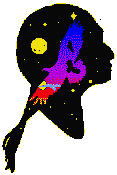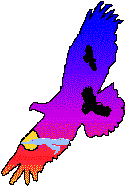

idash
AADIZOOKAANAG
|
True Stories -- Many truths. The first word -- Dibaajimowin -- in Anishinaabemowin (Ojibwe language) means just a story -- but the first part of the word -- dibaa -- is a meaning-part that suggests its words are measured, thoughtful, observed, judged. Here, those are are histories, personal narratives, experiences -- truths of that kind. The second long word -- Aadizookaan -- means "a traditional story", what anthros and all sorts of people seem to like calling legends or myths. And idash? That's "and". You'll also find Native language resources here. Did you know there's a word for "computer"? But I don't like it! See why. Items on this overmenu are themselves menus. |
|---|

|
 The BOOK REVIEWS SUBJECT INDEX for the NATIVE AMERICAN BOOKS section has many reviews of books for all ages -- from pre-readers to adults -- including contemporary Native fiction and myths and legnds. Purchase info for all reviewed books is provided. See BOOKS MAINMENU for many other features. The BOOK REVIEWS SUBJECT INDEX for the NATIVE AMERICAN BOOKS section has many reviews of books for all ages -- from pre-readers to adults -- including contemporary Native fiction and myths and legnds. Purchase info for all reviewed books is provided. See BOOKS MAINMENU for many other features.
|
|---|
<=== Native Stories 
 Many Truths ===>
Many Truths ===>
|
Shop at our online iTunes shop! There are now Cherokee stories told by Gregg Howard available through iTunes!
Pages below can also be accessed in this order from their own page-bottom menus.
Native Languages
|
|---|
Navigation Buttons
Page |
Languages |
MENU |
|---|
|
If you are not of Indian ancestry, your Indian stories must come of your personal experiences with Indian life--not myths. I encourage creativity in everyone, but there is unfortunately all too much InterNet fakery of phoney "Indian" myths that misrepresents Indian people, cultures, histories, and abuses our heritage. So if you have not had experiences with Indian people and life about which to write, do not make up Indian stories. To most Indian people, such mis-creations, especially when they promulgate alien forms of spirituality, as many "New Agers" are doing, are as bad as or worse than the robberies of land and natural resources. Page prepared by Paula Giese graphics and layout copyright 1995, 1996, 1997 Copyrights to the stories are held by their respective creators, 1995. |
|---|

 A Narrative About A Word -- "Computer"
A Narrative About A Word -- "Computer"